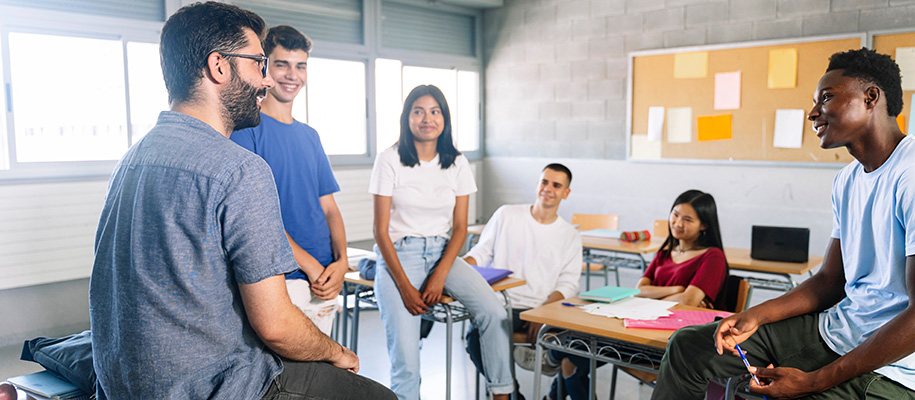Students living within families classified as low-income may lack access to essentials such as food, clothing, and utilities. But low-income students also face unique educational challenges, including fewer resources and opportunities and less support for advancement. On top of this, many don’t have the digital equipment or internet connection necessary for online education. The COVID-19 pandemic widened the income gap between low- and high-income households, further exasperating these issues. However, there are several ways Social-Emotional Learning can help low-income students thrive both in the current crisis and beyond.
What is Social-Emotional Learning?
Social-Emotional Learning (SEL) is the vital framework through which people of all ages acquire skills to better work toward their own unique goals, comprehend and manage their emotions, nurture positive relationships, make informed choices, and feel and exhibit empathy. Learning SEL provides students with the abilities required to succeed in life, both academically and beyond.
How SEL can be taught in the classroom
It's widely considered that teaching social and emotional learning from an early age helps students develop skills that can be carried throughout their childhood and adolescence. Teaching SEL in school generally follows a series of steps, including:
- Step 1: An explanation of a particular SEL concept by the teacher, often using pictures, video, audio, or written text.
- Step 2: Students gain a deeper understanding of the concept through skill practice, discussion with a peer group or partner, and/or individual writing tasks.
- Step 3: The teacher revisits and reinforces concepts throughout the week. They may also send work home for students to work on alongside their parents or guardians.
- Step 4: The teacher then checks for understanding moving forward, re-teaching specific points as required.
Related: How to Manage Emotions During Tumultuous Times
How SEL can help low-income students
There are a variety of ways Social-Emotional Learning can benefit disadvantaged students to help them succeed in the classroom, improve their academic performance, and put them on the path to future success. Here are five reasons why SEL is more important than ever in today’s climate.
1. Coping with stress
Life can be stressful at any time, but COVID-19 threw the world into disarray. Families of low-income students were some of the first to suffer from economic instability and a rise in unemployment. Add strict social distancing guidelines, the need to wear masks, and general uncertainty about the future, and you’ve got the perfect recipe for extreme mental stress for already vulnerable children.
For many students from low-income families, school was the one stable element in their lives before the pandemic. After months of school closures, emergency remote instruction, and stay-at-home orders, some schools switched to remote learning exclusively, while others tried different hybrid models with more or less success. Some schools opened their doors only to end up in quarantine a few weeks later. Disruptions aside, both in school and with distance learning, educators all over the US are focusing on assisting disadvantaged students with a wide range of resources that can give students the self-management tools they need to process the unavoidable changes and instability of a global pandemic as well as their emotions and fears.
2. Enhancing academic success
There’s a strong correlation between a student’s emotional and social well-being and their academic performance. Studies show that SEL programs help improve test grades and increase graduation rates as they cultivate a learning environment where students feel safe and valued, fostering a positive attitude toward education. Students who feel comfortable with their educators are also more likely to communicate and engage in class activities or distance learning meetings, improving the learning experience.
3. Reducing behavioral problems
In many schools, Social-Emotional Learning is a vital tool to discourage harmful and antisocial behaviors. An effective SEL program teaches students to regulate their emotions, take responsibility for their decisions, and empathize with others. These social skills lead students to naturally display more positive, socially adapted behavior, preventing disruptions to their learning processes.
Related: Mental Health and Discrimination: Facts, Resources, and Advice for Students
4. Promoting equal opportunities
Some children have the advantage of having a supportive, invested family with a wealth of resources, while others are stuck in a vicious cycle of poverty that bogs down generation after generation. SEL curriculums offer a way to bridge this socioeconomic gap and give every student an opportunity to thrive. Social-emotional skills allow students to overcome income-related obstacles by encouraging positive goals and constructive plans while giving them the self-confidence to make empowering decisions. They also reduce anxiety, depression, and social withdrawal, among other emotional conditions that can affect a student’s education and personal life.
5. Investing in a student’s future
SEL focuses on valuable lifelong skills that can positively impact a students’ entire future, influencing their personal, professional, and social success. When a college graduate is looking for employment, they have to demonstrate relevant education, necessary technical skills, and prior experience. This step is essential, but it’s not enough. More and more often, employers emphasize qualities such as:
- Effective communication
- Fluent teamwork
- Self-motivation
- Independent thinking
- Problem-solving skills
And there’s good reason for this. Employers understand that high motivation, stellar interpersonal skills, and well-balanced decision-making may be just as crucial to the team as a prestigious degree and technical proficiency. Social-emotional skills assist with these requirements, granting applicants the ability to take personal responsibility, self-regulate, and demonstrate positive social skills. These “real-life” skills can tilt the decision in favor of the more socially and emotionally adapted candidate.
Related: 9 Tips for Developing Soft Skills Before Graduation
Social and emotional learning can make a tremendous, lifelong difference for disadvantaged students by giving them the tools they need to improve their emotional well-being and social behavior. The result is improved academic performance and more available opportunities for future career paths.
For more advice specific to low-income and other disadvantaged families, check out this article on Reliable Advice for Disadvantaged Students Conducting Their College Search.





